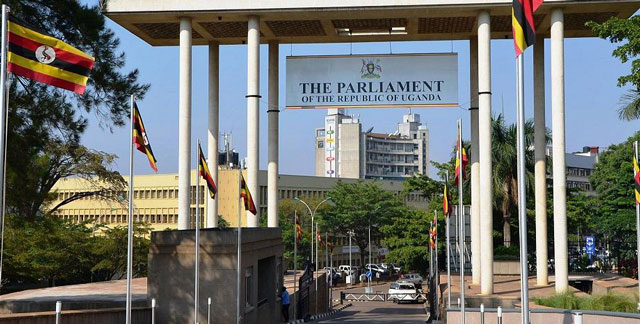
Pyrrhic victory
To Kakonge, Ocheng himself did not believe in his own allegations that he wanted to convince parliament to believe. He warned those who saw victory in Ocheng’s motion that it was victory with no winner. “Some of us cannot see it, they take it as victory. True it is a victory, but a pyrrhic victory: for one more such victory and Uganda will be lost. It’s a pyrrhic victory which teaches us one lesson: we swim or sink together. Mr Speaker, I do beg to oppose the whole motion,” Kakonge summed up his submission.
With Kakonge the only dissenting voice, Parliament passed the motion suspending Amin and directing an inquiry into his bank account.
The following day, on February 5, Defence Minister Felix Onama sent Amin on a short leave, not on suspension. But things moved very fast.
Phares Mutibwa, in his 1992 book, Uganda since Independence: a story of unfulfilled hopes, says Ibingira, with backing from Sir Edward Mutesa, was pushing for the control of the ruling party, and later, the government. On page 38, Mutibwa captures it thus: “The political dispute between Obote and Ibingira and his supporters centered around the control of UPC and ultimately the very leadership of the country in terms of the political and economic ideologies that were to be followed.” While Obote preached Socialism and rallied his government to “move to the left”, Ibingira was a capitalist.
With neither harmony in the ruling party, nor in government, Obote returned from his long tour of Northern Uganda, on February 12, to take charge. In his 1968 article, Obote says the situation compelled him to take what he called drastic actions. On February 22, 1966, some 18 days after the Ocheng motion in parliament, five cabinet ministers were arrested during a cabinet meeting. The five included Grace Ibingira, Dr Emmanuel Lumu, Balaki Kirya, Mathias Ngobi and George Magezi.
Akena Adoko, who at the time headed the General Service Unit, a Uganda government internal and external security agency, quotes Ibingira after his arrest: “Fate is a double-crosser. I was the very person who saved from being repealed, the Deportation Ordinance.” Opposition legislators had introduced a motion, in late 1965, seeking to repeal a colonial era law that gave government powers to detain suspects without trial. Ibingira convinced parliament not to repeal it.
Two days after the arrests, the 1962 Constitution had been put aside, replaced with an interim one that dismissed Sir Edward Mutesa as president of Uganda and Sir Wilberforce Nadiope as vice president. The same constitution made Obote Executive President. Obote addressed the press thus: “Recently, attempts were made to remove my government by the use of foreign troops…To safeguard our sovereignty, we must take counter measures: suspending the constitution, and hence posts of president and that of vice president.”
By the end of May 1966, Sir Edward Mutesa was in exile, his palace lying in ruin after a military raid under the command of Amin, who had by now been elevated to head the army. He would die three years on November 21, 1969, two days after celebrating his 45th birthday. From then on, Uganda’s political problems would be solved by military means. Brigadier Opolot was already serving time in Luzira Prison, only to be released in January 1971, by Amin.
Daudi Ocheng, the man whose motion started it all, died suddenly on June 1, 1966, aged 41 years. In his 2018 autobiography, Dr Martin Aliker, a veteran dentist, politician and businessman explained that Ocheng was diagnosed with cancer of the stomach shortly before he died. Ocheng was Aliker’s elder brother. His death came just eight days after the attack on, and exiling of, Sir Edward Mutesa, his closest friend and 99 days after the February 4 motion. He may not have lived for 100 years, but 53 years after the motion, its effects are still visible.
Meanwhile more promotions would come Amin’s way, to Brigadier by 1969 and to Major-General by January 1971 when, using the army, he turned against Obote and overthrew him.
A young man named Yoweri Museveni watched these developments keenly as a secondary school student in Mbarara district. He would write later, in his book “Sowing the Mustard Seed”, that he and fellow students began asking themselves questions about the future of Uganda. After graduating from university in Tanzania in 1970, he secured a job in President Obote’s office just months before Amin’s coup. Obote had lost power through the only means he thought he had total control over – the military. The young Museveni was, meanwhile, thinking about fighting the new president. “Amin took power on January 25, 1971 and two days later, on January 27, I had left the country to go and prepare to fight him,” Museveni told a conference of judges last week, 48 years after Amin’s coup and 33 years after Museveni’s own military take-over of government.
By the end of 1978, Ugandans living in exile had forced their way back with the military support of Tanzania. General Idi Amin would be pushed out of power in April 1979.
The rigged elections in December 1980 that forced Museveni to pick up arms on February 6, 1981 were meant to restore order and dialogue after the brutal years of Amin’s rule. Whenever dialogue has failed to address political questions of the day, there’s been recourse to the gun, from 1966 to 1971, 1979, and 1981 and beyond.
President Museveni has been a student of, and then a participant in, this cycle of violence; the reason he said emphasised the UPDF capacity to defeat “whoever thinks of destabilising Uganda” on February 6, 2019.
*****
URN
 The Independent Uganda: You get the Truth we Pay the Price
The Independent Uganda: You get the Truth we Pay the Price



